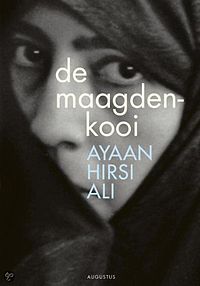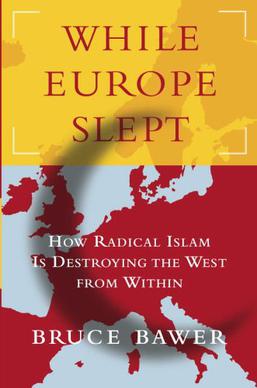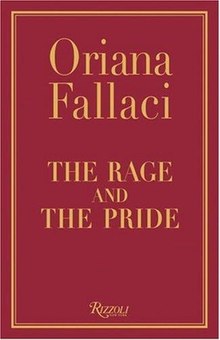
Oriana Fallaci was an Italian journalist and author. A partisan during World War II, she had a long and successful journalistic career. Fallaci became famous worldwide for her coverage of war and revolution, and her "long, aggressive and revealing interviews" with many world leaders during the 1960s, 1970s, and 1980s.

Eurabia is a political neologism, a portmanteau of Europe and Arabia, used to describe a far-right, anti-Muslim conspiracy theory, involving globalist entities which are allegedly led by French and Arab powers, to Islamize and Arabize Europe, thereby weakening its existing culture and undermining its previous alliances with the United States and Israel.
Gisèle Littman, better known by her pen name Bat Ye'or is an Egyptian-born British author, best known for creating and popularising the Eurabia conspiracy theory in her writings about modern Europe, in which she argues that Islam, anti-Americanism and antisemitism hold sway over European culture and politics.
The Force of Reason is a 2004 book by Oriana Fallaci. The book is a follow-up to The Rage and the Pride, aimed at her public critics, accusations of racism, and the lawsuits and death-threats launched against her. The book became a bestseller, selling 800,000 copies in Italy alone.
"Islamofascism", first described as "Islamic fascism" in 1933, is a term popularized in the 1990s drawing an analogical comparison between the ideological characteristics of specific Islamist or Islamic fundamentalist movements and short-lived European fascist movements of the early 20th century, neo-fascist movements, or totalitarianism.

The Caged Virgin: A Muslim Woman's Cry for Reason, also published as The Caged Virgin: An Emancipation Proclamation for Women and Islam, is a 2004 book by the former Dutch parliamentarian Ayaan Hirsi Ali. The Caged Virgin was first published in English in 2006.
"Londonistan" is a sobriquet referring to the British capital of London and the growing Muslim population of late-20th- and early-21st-century London.

Evangelos Averoff-Tositsa was a Greek politician, leader of the right wing party New Democracy (1981–1984), member of parliament, and author.

Aslim Taslam is a phrase meaning "submit and you will get salvation", taken from the letters sent by the Islamic prophet Muhammad to various kings and rulers in which he urged them to convert to Islam.
Lan astaslem is an Arabic phrase meaning "I will not surrender". The term is used by Christians in reference to Aslim Taslam.

In sha Allah or Inshallah is a real life based novel written by Oriana Fallaci chronicling the experiences of a fictional group of Italian soldiers on a 1983 peace keeping mission in Beirut. The novel draws heavily on Fallaci's own experiences of war, covering the Middle East as a war correspondent throughout the 1980s. It has been published in Italy by the editor Rizzoli in 1990. The title refers to the Arabic phrase إن شاء الله that means "God willing" or "if Allah wills".

Douglas Kear Murray is a British author and political commentator. He founded the Centre for Social Cohesion in 2007, which became part of the Henry Jackson Society, where he was associate director from 2011 to 2018. He is also an associate editor of the conservative-leaning British political and cultural magazine The Spectator. Murray has also written columns for publications such as The Wall Street Journal.

Reflections on the Revolution in Europe: Immigration, Islam, and the West is a 2009 book by Christopher Caldwell about the impact of the mass immigration of Muslims to Europe in the 20th century.
Walid al-Kubaisi was a Norwegian-Iraqi author, journalist, translator, film director and government scholar. He notably criticised the alleged influence of the Muslim Brotherhood in the documentary film Frihet, likhet og det muslimske brorskap. He was an engineer by education.
Hallgrim Berg is a Norwegian author, traditional folk musician, and former politician for the Conservative Party. He was a member of the Norwegian Parliament from 1982 to 1997, representing Buskerud. He has released several books and been involved in several musical albums, and held numerous public positions.

While Europe Slept: How Radical Islam is Destroying the West from Within is a 2006 book by Bruce Bawer. It was Bawer's second book dealing with the issue of religious fundamentalism, following his earlier Stealing Jesus: How Fundamentalism Betrays Christianity, a critique of fundamentalist Christianity published in 1998.
Counter-jihad, also spelled counterjihad and known as the counter-jihad movement, is a self-titled political current loosely consisting of authors, bloggers, think tanks, street movements and campaign organisations all linked by apocalyptic beliefs that view Islam not as a religion but as a worldview that constitutes an existential threat to Western civilization. Consequently, counter-jihadists consider all Muslims as a potential threat, especially when they are already living within Western boundaries. Western Muslims accordingly are portrayed as a "fifth column", collectively seeking to destabilize Western nations' identity and values for the benefit of an international Islamic movement intent on the establishment of a caliphate in Western countries. The counter-jihad movement has been variously described as anti-Islamic, Islamophobic, inciting hatred against Muslims, and far-right. Influential figures in the movement include the far-right anti-Muslim conspiracy theorists Pamela Geller and Robert Spencer.

TheCimitero Evangelicoagli Allori is located in Florence, Italy, between 'Due Strade' and Galluzzo.

Submission is a novel by French writer Michel Houellebecq. The French edition of the book was published on 7 January 2015 by Flammarion, with German (Unterwerfung) and Italian (Sottomissione) translations also published in January. The book instantly became a bestseller in France, Germany and Italy. The English edition of the book, translated by Lorin Stein, was published on 10 September 2015.
Islamophobia in the media refers to negative coverage of Islam-related topics, Muslims, or Arabs by media outlets in a way that is hostile, untrue, and/or misleading. Islamophobia is defined as "Intense dislike or fear of Islam, especially as a political force; hostility or prejudice towards Muslims", and the study of how and to what extent the media furthers Islamophobia has been the subject of much academic and political discussion.











